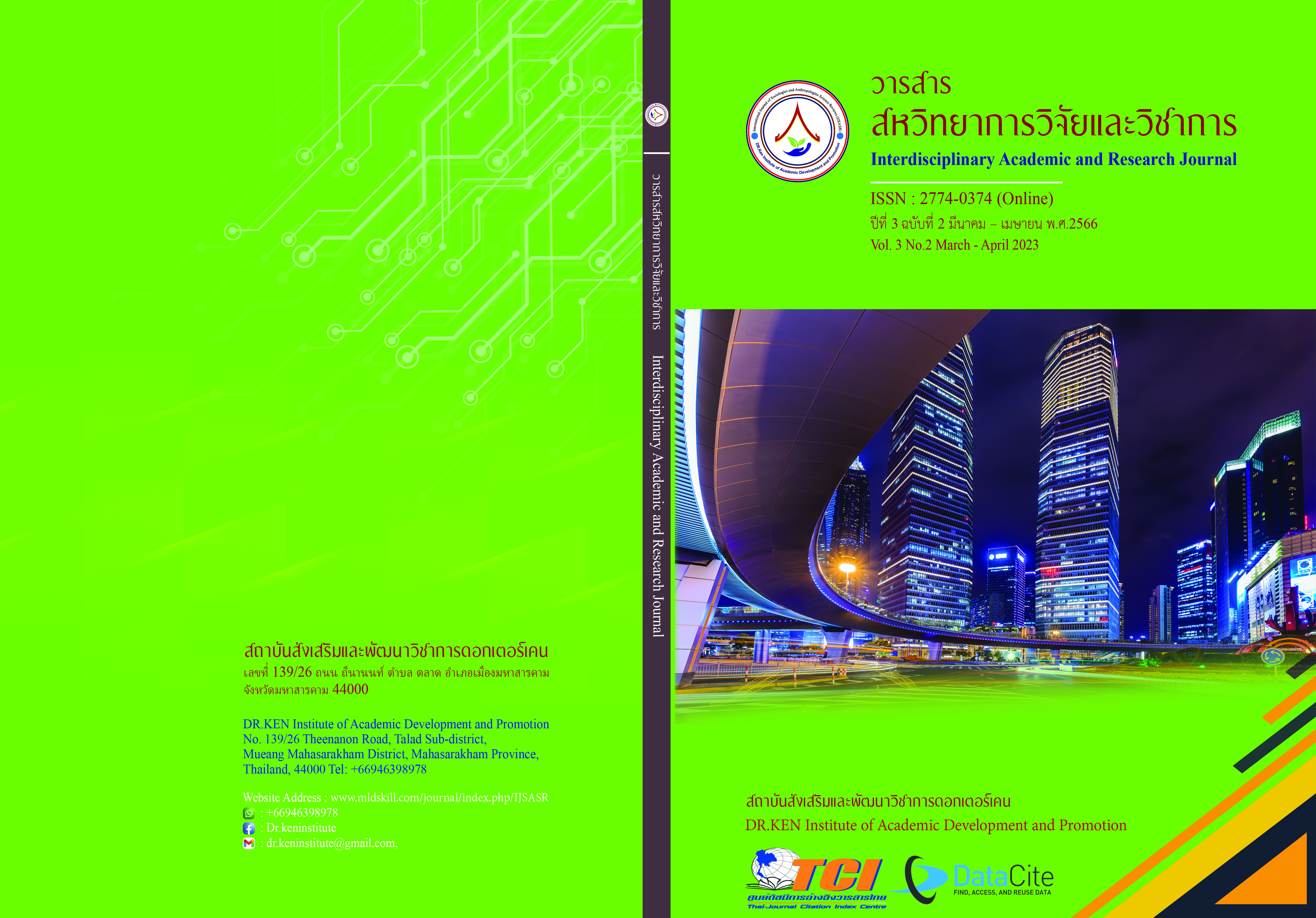Model of Knowledge Management of Cannabis Ancient Medicinal Formulations for Medicinal Purposes
DOI:
https://doi.org/10.14456/iarj.2023.92Keywords:
Knowledge Management; , Medicinal Cannabis Use; , Ancient MedicineAbstract
Knowledge Management (KM) is the acquisition of accurate and appropriate knowledge by the right people at the right time and enables individuals to share operational information, which strives to improve the performance of an organization. Acquisition of the correct knowledge must be managed systematically, ready to be utilized for the benefit of operations. The Key Principles for Transforming Tacit Knowledge into Explicit Knowledge. Thus, this research was qualitative research aimed at (1) studying the condition of cannabis ancient medicinal formulations for medicinal purposes. (2) Studying the knowledge management of cannabis ancient medicinal formulations for medicinal purposes, and (3) creating a Model of Knowledge Management of cannabis ancient medicinal formulations for medicinal purposes. The target groups were 8 experts selected by purposive sampling. The research tools were interviews and model assessments. The statistics used were percentage, mean, and standard deviation. The research results found that: 1) The condition of the use of cannabis ancient medicinal formulas for the treatment of diseases found that: The use of ancient medicinal cannabis for medicinal purposes is Panjarat Elemental Medicine Formula Selected from the ancient Thai Yai ethnic drug scriptures containing mixed marijuana have been certified by indigenous healers consists of 2 aspects: (1.1) factors in the use of ancient medicinal formulas which must have clear drug prescribing guidelines and (1.2) guidelines for the use of traditional drug formulas which must have clear procedures for providing services. 2) The study of knowledge management about cannabis ancient medicinal formulas for medicinal purposes found that: knowledge management of ancient medicinal formulas on cannabis for medicinal purposes, consists of 3 parts: (1) knowledge management goals (2) The knowledge management of cannabis ancient medicinal formulas for medicinal purposes was found that the Panjathat medicinal formula consisted of 5 parts candle 3 parts, 5 Koti 2 parts, 2 moons 4 parts, saffron 1 part, cardamom. 2 parts, clove 3 parts, moonflower 1 part, Luk Chan 1 part, Cha-plu 2 parts, the total is 19 parts, then mix Pang (all 5 marijuana) all 4 marijuana except flowers 34.4 parts and cannabis flowers 0.1 parts. to be extracted as medicine From the group discussion, it was concluded that according to the Royal Gazette that said Cannabis or cannabis plants and objects or substances contained in the cannabis plant and extracts containing tetrahydrocannabinol not more than 0.02%, not classified as drug category 5, and 3) Create a knowledge management model of cannabis ancient medicinal formulas for the treatment of diseases was found that The knowledge management model of ancient medicinal formulas Regarding medicinal cannabis, it consists of 4 components: principles and rationale, objectives, content and knowledge management of ancient medicinal formulas. on cannabis for medicinal purposes The evaluation results of the draft knowledge management model on ancient medicinal formulas on cannabis for medicinal purposes suitability Overall was at a high level. possibility Overall was at a high level. and usefulness Overall was at the highest level.
References
กระทรวงสาธารณสุข. (2562). คำแนะนำสำหรับแพทย์ การใช้กัญชาทางการแพทย์.นนทบุรี: กรมการแพทย์.
จริยา ปันทวังกูร. (2563). การจัดการความรู้ในสถาบันอุดมศึกษา. วารสารวิชาการและวิจัย มหาวิทยาลัยภาคตะวันออกเฉียงเหนือ.10(3), 289-303.
ธิดารัตน์ ศิริรัตน์. (2557). การจัดการความรู้ของครูภูมิปัญญาไทยเพื่อส่งเสริมการเรียนรู้ตลอดชีวิตของชุมชนในเขตภาคใต้. วารสารอิเล็กทรอนิกส์ทางการศึกษา. 9(4), 80-92.
บุญชม ศรีสะอาด. (2553). การวิจัยเบื้องต้น. พิมพ์ครั้งที่ 8. กรุงเทพฯ : สุวีริยาสาส์น.
พิมพ์ชนก วรรณแจ่ม. (2560). รูปแบบการดูแลรักษาสุขภาพโดยใช้ภูมิปัญญาท้องถิ่นด้านการแพทย์พื้นบ้าน ในอำเภอท่าตะเกียบจังหวัดฉะเชิงเทรา. วารสารมนุษยศาสตร์และสังคมศาสตร์ วไลยอลงกรณ์ ในพระบรมราชูปถัมภ์. 12(3), 129-139.
ไพศาล วรคำ. (2561). การวิจัยทางการศึกษา. มหาสารคาม : ตักสิลาการพิมพ์.
ราชกิจจานุเบกษา. (2564). พระราชบัญญัติให้ใช้ประมวลกฎหมายยาเสพติด พ.ศ. 2564. กรุงเทพฯ :ราชกิจจานุเบกษา.
วินัยธร วิชัยดิษฐ์. (2560). การจัดการความรู้กระบวนการผลิตและการบริหารจัดการวิสาหกิจชุมชนต้นแบบเขตธนบุรีโดยชุมชนมีส่วนร่วม. จันทรเกษมสาร. 23(45), 17-32.
วิภาพรรณ พินลา. (2560). การพัฒนารูปแบบการจัดการเรียนรู้ท้องถิ่นศึกษา เพื่อส่งเสริมพฤติกรรมการอนุรักษ์ภูมิปัญญาท้องถิ่น สำหรับนิสิตปริญญาตรี. กรุงเทพฯ : มหาวิทยาลัยศิลปากร.
วิรัตน์ ทรงทวีสิน. (2562). การพัฒนารูปแบบการจัดการความรู้ของกลุ่มอาชีพผ้าทอมือจังหวัดเลย. วารสารศึกษาศาสตร์ มหาวิทยาลัยนเรศวร. 21(2), 297-310.
สมศักดิ์ อรรฆศิลป์. (2562). นโยบายสุขภาพที่เกี่ยวกับการใช้กัญชาทางการแพทย์. วารสารกรมการแพทย์. 44(1), 10-12.
Henrie, M., & Hedgepeth, O. (2003). Size is important in knowledge management. Retrieved from: http://www.tlainc.com/artc153.htm.
Horwitch, M., & Armacost, J. (2002). Helping Knowledge Management Be All It Can Be. The Journal of Business Strategy. 23, 123-140.
Smith, Heather A., & Mckeen, James D. (2013). Developments in Practice IX: The Evolution of the KM Function. Retrieved from: http://aisel.aisnet.org/cais/vol12/iss1/4
Downloads
Published
How to Cite
Issue
Section
License
Copyright (c) 2023 ธีรศักดิ์ ศิริพยัคฆ์, ชยากานต์ เรืองสุวรรณ, วิมลมาศ ปฐมวณิชกุล

This work is licensed under a Creative Commons Attribution-NonCommercial-NoDerivatives 4.0 International License.
Copyright on any article in the Interdisciplinary Academic and Research Journal is retained by the author(s) under the under the Creative Commons Attribution-NonCommercial-NoDerivatives 4.0 International License. Permission to use text, content, images, etc. of publication. Any user to read, download, copy, distribute, print, search, or link to the full texts of articles, crawl them for indexing, pass them as data to software, or use them for any other lawful purpose. But do not use it for commercial use or with the intent to benefit any business.
















.png)


